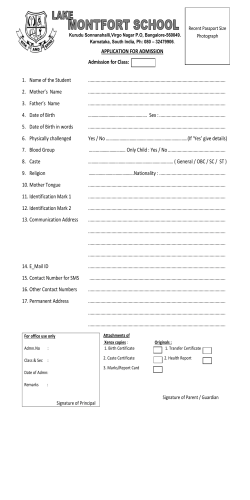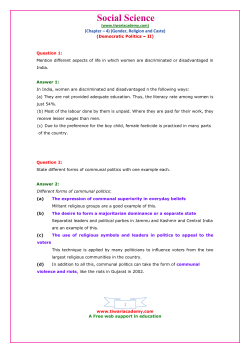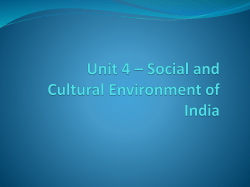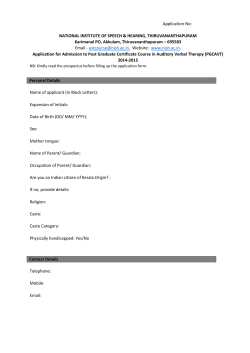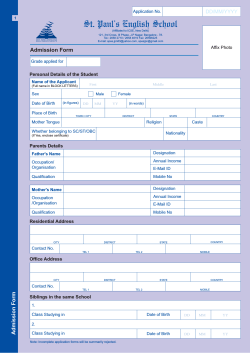
HIGH COURT OF CHHATTISGARH AT BILASPUR
HIGH COURT OF CHHATTISGARH AT BILASPUR ----------------------------------------------------------------------------------------------------SINGLE BENCH: HON'BLE SHRI JUSTICE SANJAY K. AGRAWAL ----------------------------------------------------------------------------------------------------- W.P. No. 4134/2005 PETITIONER : Smt. Rekha Khande Versus RESPONDENTS : State of Chhattisgarh and others (WRIT PETITION UNDER ARTICLE 226/227 OF THE CONSTITUTION OF INDIA) Present: Mr. Mayank Chandrakar, counsel for the petitioner. Mr. Sangharsh Pandey, Dy. Govt. Advocate for the State/respondent. ORDER ON BOARD (Passed on 20/03/2015) 1. Petitioner was appointed as a Supervisor in the Department of Woman and Child Development by order dated 04/06/1987 as a Scheduled Caste candidate and thereafter, her caste certificate was verified by the High Level Caste Scrutiny Committee. The said Committee by its order dated 05/01/2005, cancelled the caste certificate issued in favour of the petitioner and held that she is not entitled for the caste certificate as she is not a member of Scheduled Caste and consequently State Government ordered for cancellation of her appointment granted on the reserved post of Supervisor in the Department. 2. Questioning the said order, instant writ petition has been filed 2 by the petitioner stating inter alia that by virtue of marriage with schedule tribe person, she has acquired the status of scheduled caste and therefore caste certificate (SC) was rightly granted by the Competent Authority in her favour and finding recorded by Caste Scrutiny Committee holding her not entitled for such a certificate deserves to be set-aside being unsustainable and bad in law. 3. Return has been filed by the State stating inter alia that the caste certificate issued in favour of the petitioner has already been cancelled by the High Level Caste Scrutiny Committee, therefore, the State Government has rightly cancelled the appointment of the petitioner obtained against the reserved post of Supervisor, and even otherwise the order dated 05/01/2005 is in accordance with law and no interference is called for in exercise of supervisory jurisdiction under Article 227 of the Constitution of India. 4. Mr. Mayank Chandrakar learned counsel appearing for the petitioner would submit that petitioner has married with Shri K.D. Khande, who is a member of Scheduled Caste, and in consequence of marriage her status would be of Scheduled Caste after marriage, therefore, she was entitled for caste certificate (SC) as well reserved post of Scheduled Caste, as such, the order impugned dated 05/01/2005 and consequent order of State Government deserves to be set-aside. 5. Mr. Sangharsh Pandey learned Deputy Govt. Advocate appearing for the State would submit that petitioner's caste 3 certificate has been cancelled by order dated 05/01/2005 of the High Level Caste Scrutiny Committee, and on the basis of order of High Level Caste Scrutiny Committee, her appointment on the reserved post of Supervisor has rightly been cancelled by the State Government. The order of Caste Scrutiny Committee as well as order passed by the State Govt. is in accordance with law and no interference is called for in exercise of jurisdiction under Article 227 of the Constitution of India. 6. I have heard learned counsel appearing for the parties and perused the available record with utmost circumspection. 7. It is not in dispute that the petitioner is admittedly a member of Other Backward Class and she married with Shri K. D. Khande, who is a member of Scheduled Caste. It is also not in dispute that the petitioner was selected on the reserved post of Supervisor and the High Level Caste Scrutiny Committee by its order dated 05/01/2005 has cancelled the caste certificate issued in favour of the petitioner on 12/06/1985 holding her ineligible for such certificate. 8. The question for consideration would be whether the finding of the Caste Scrutiny Committee holding that the petitioner is not entitled for caste certificate of scheduled caste is perverse and contrary to the record? 9. A careful perusal of the order passed by Caste Scrutiny Committee would show that the petitioner’s father was originally 4 resident of Maharashtra belonging to Padhamshali (Koshti caste) which stood recorded in her school record and the petitioner married with Shri K. D. Khande a member of scheduled caste on 05/12/1984 and thereafter she was granted caste certificate of scheduled caste by Naib Tahsildar, Bilaspur on 12/06/1985. Not only this, she also made a statement before the Committee that her father belonged to Padhamshali (Koshti caste) and on the cover of marriage, she has obtained caste certificate of Scheduled Caste and obtained Govt. Job in the reserved seat for Scheduled Caste. 10. The Govt. of India Ministry of Home Affairs has issued notification No. 35/1/72/R.V./[S.T.C.V.] April 1975 stating that a person who is not member of Scheduled Caste or Scheduled Tribe by birth, marries with Scheduled Caste or Scheduled Tribe, then he/she is not entitled for the caste certificate of Scheduled Caste/Scheduled Tribe and the privileges of such caste. Likewise the circular issued by the State of Madhya Pradesh on 01/08/1996, provides at Para-12 as follows:- **12- ¼1½ ;fn dk sb Z O;fDr tUe l s gh vuq l wf pr tkfr ;k tutkfr dk lnL; ugh a gS rk s mldk fookg vuq l wf pr tkfr vFkok tutkfr d s lnL; l s gk sr k gS rk s ml s tkfr iz e k.k&i= iz k Ir dju s dh ik=rk ugh a gk sx hA ¼2½ ;fn dk sb Z O;fDr vuq l wf pr tkfr vFkok vuq l wf pr tutkfr dk lnL; gS vkS j og xS j vuq l wf pr tkfr ,o a vuq l wf pr tutkfr d s lnL; vFkkZ r ~ lkekU; oxZ d s lnL; l s fookg dj y sr k gS rk s Hkh mUg s a iz e k.k&i= iz k Ir dju s dh ik=rk gk sx hA** 11. In the matter of Valsamma Paul (Mrs.) v. Cochin University 5 and others1, their Lordships of the Supreme Court has held that when a woman marries outside her caste, she became member of the family of her husband and observed in paragraph 31 as under:“31.It is well-settled law from Bhoobum Moyee Debia v. Ram Kishore Achari Chowdhry [(1863-66) 10 MLA 279 : 3WR 15 (PC)] that judiciary recognized a century-and-ahalf ago that a husband and wife are one under Hindu law, and so long as the wife survives, she is half of the husband. She is ‘Sapinda’ of her husband as held in Lullobhoy Bappoobhoy Cassidass Moolchund v. Cassibai [(1879-80) 7 IA 212]. It would therefore, be clear that be it either under the Canon law or the Hindu law, on marriage the wife becomes an integral part of the husband’s marital home entitled to equal status of husband as a member of the family. Therefore, the land, on marriage, becomes a member of the family and thereby she becomes a member of the caste to which she moved. The caste rigidity breaks down and would stand no impediment to her becoming a member of the family to which the husband belongs and she gets herself transplanted.” ” 12. However, in later part of judgment paragraph 33 , the Supreme Court formulated the following question for determination:“33…….Whether a lady marrying a Scheduled Caste, Scheduled Tribe or OBC citizen, or one transplanted by adoption or any other voluntary act, ipso facto, becomes entitled to claim reservation under Article 15(4) of 16(4), as the case may be?” 13. The said question by their Lordships was answered in paragraph 34 of judgment as under: “34. In Murlidhar Dayandeo Keekar v. Vishwanath Pandu Barde and R. Chandevarappa v. State of Karnataka this Court has held that economic empowerment is a fundamental right to the poor and the State is enjoined under Article 15(3), 46 and 39 to provide them opportunities. Thus, education, employment and 1 (1996) 3 SCC 545 6 economic empowerment are some of the programmes the State has evolved and also provided reservation in admission into education institutions, or in case of other economic benefits under Articles 15(4) and 46, or in appointment to an office or a post under the State under Article 16(4) Therefore, when a member is transplanted into the Dalits, Tribes and OBCs, he/she must of necessity also have had undergone the same handicaps, and must have been subjected to the same disabilities, disadvantages, indignities or sufferings so as to entitle the candidate to avail the facility of reservation. A candidate who had the advantageous start in lie being born in forward caste and had march of advantageous life but is transplanted in Backward caste by adoption or marriage or conversion, does not become eligible to the benefit of reservation either under Article 15(4) or 16(4), as the case may be. Acquisition of the status of Scheduled Caste, etc, by voluntary mobility into these categories would play fraud on the Constitution, and would frustrate the benign constitutional policy under Article 15(4) and 16(4) of the Constitution.” 14. Thereafter in the matter of Sobha Hymavathi Devi v. Setti Gangadhara Swamy and others2, the Supreme Court considered the question whether a non-tribal who marries with a tribal could claim to contest a seat reserved for tribal and held as under:“10. ………Even otherwise, we have difficulty in accepting the position that a non-tribal who marries a tribal could claim to contest a seat reserved for tribals. Article 332 of the Constitution speaks of reservation of seats for Scheduled Tribes in Legislative Assemblies. The object is clearly to give representation in the legislature to Scheduled Tribe candidates, considered to be deserving of such special protection. To permit a non-tribal under cover of a marriage to contest such a seat would tend to defeat the very object of such a reservation. The decision of this Court in Valsamma Paul v. Cochin University supports this view. Neither the fact that a non-backward female married a backward male nor the fact that she was recognized by the community thereafter as a member of 2 (2005) 2 SCC 244 7 the backward community, was held to enable a nonbackward to claim reservation in terms of Article 15(4) or 16(4) of the Constitution.” 15. Recently the Supreme Court noticed the judgment of Valsamma Paul (supra) and Sobha Hymavathi Devi (supra) in the matter of Rameshbhai Dabhai Naika v. State of Gujarat and others3, and held as under:“16. The third plea raised by Sobha in support of her being a tribal and the claim of Valsamma were both based on their voluntary action in marrying a tribal man. In both cases the Court held that getting transplanted into the tribal community through voluntary mobility cannot be the basis or the forward caste/non-tribal woman to avail of the benefits of reservation under Article 15 and 16 (in Valsamma) or under Article 332 of the Constitution (in Sobha Hymavathi Devi). But in neither of the two cases the question of a child born of an inter-caste marriage or a marriage between a tribal and a non-tribal was directly in issue.” 16. Applying the principle of law laid down in the aforesaid cases i.e. Valsamma Paul, Sobha Hymavathi Devi and Rameshbhai Dabhai Naika (supra) it is held that a non-S.C. woman marrying with a man belonging to Scheduled Caste is not entitled to avail the benefits of Scheduled Caste under Article 15, 16, 332 of the Constitution of India. Reverting to the facts of the case, it would apparent that petitioner is originally member of Padhamshali (Koshti caste) and under the cover of marriage with her husband who is a member of Scheduled Caste, had claimed and obtained the caste certificate of scheduled caste, which the Caste Scrutiny Committee has held not entitled. On the basis of material brought on record as 3 (2012) 3 SCC 400 8 well the circular issued by the Govt. of India and erstwhile State of Madhya Pradesh and relying upon the judgment of Supreme Court in the matter of Valsamma Paul (supra), in the considered opinion of this Court, the findings recorded by the Caste Scrutiny Committee is in accordance with circular issued by the Govt. of India and State of Madhya Pradesh as well as principle of law laid down by the Supreme Court in the aforesaid cases i.e. Valsamma Paul, Sobha Hymavathi Devi and Rameshbhai Dabhai Naika (supra). It is neither perverse, nor contrary to the material available on the record. 17. As a fallout and consequence of the aforesaid discussion, it is held that the Caste Scrutiny Committee did not err in reaching to such a finding that petitioner is not entitled for caste certificate of Scheduled Caste and as such, the finding is based on material available on record and the petitioner's appointment on the reserved post has rightly been cancelled on the basis of revocation of her caste certificate by the High Level Caste Scrutiny Committee. I do not find any illegality or jurisdictional error in the said finding recorded by the Caste Scrutiny Committee. 18. Accordingly, the writ petition deserves to be and is hereby dismissed. No order as to cost(s). JUDGE Tiwari 9 1 HEAD-NOTE Non-S.C. woman marrying with a person belonging to Scheduled Caste is not entitled to avail the benefits and privilege of Scheduled Caste. ,d vuqlwfpr tkfr ds O;fDr ls fookg djus okyh xSj vuqlwfpr tkfr dh efgyk vuqlwfpr tkfr dks izkIr ykHk vkSj fo'ks”kkf/kdkj dk miHkksx djus dk gdnkj ugh gSA (Indrajeet Sahu) P.S. To His Lordship
© Copyright 2026

